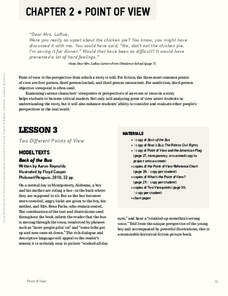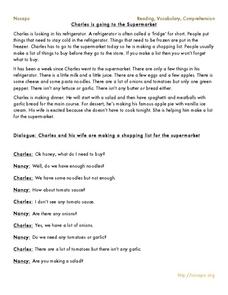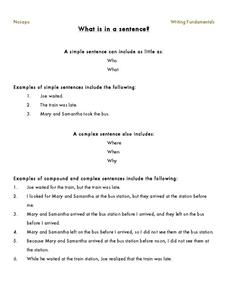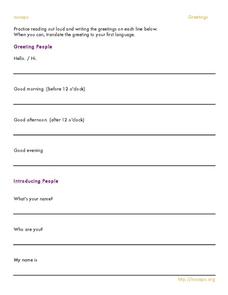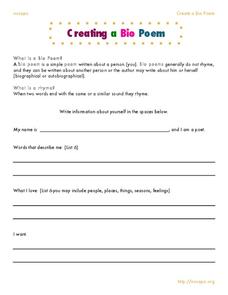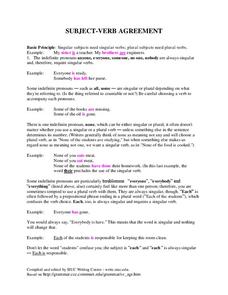MENSA Education & Research Foundation
Magical Musical Tour: Using Lyrics to Teach Literary Elements
Language arts learners don't need a lecture about poetry; they listen to poetry every day on the radio! Apply skills from literary analysis to famous songs and beautiful lyrics with a instructional activity about literary devices. As...
Achieve3000
Figurative Language
Similes and metaphors make writing more beautiful and detailed, but can be a little harder to decipher during a first reading. Use a passage from The Man Who Loved Words to show young readers how to think through passages that contain...
Scholastic
Point of View
The point of view in a story can dramatically change the story itself. Focus on finding the points of view in various reading passages with a language arts packet, which includes fiction and nonfiction text.
Nosapo
Reading, Vocabulary, Comprehension
Whether you teach mainstream elementary classes or older English learners, a set of reading comprehension resources is a great addition to your language arts curriculum. Ten activities each include a reading passage and set of...
Nosapo
What Is in a Sentence, Paragraph, and Story?
Language arts is made up of many parts. Learners review the parts of a sentence, as well as how to make a simple sentence into a complex sentence, before examining full paragraphs and identifying the topic, body, and concluding sentence...
Smekens Education Solutions, Inc.
Introducing the 6 Traits to Students
Put together an English language arts unit on the six traits of writing with this helpful collection of resources. From fun songs to differentiated writing exercises reinforcing each of the traits, great ideas are provided for developing...
Nosapo
Greetings
Hi! How are you? Join the conversation with a straightforward exercise on English greetings. After translating common greetings into their first languages, class members practice greeting each other and note the appropriate responses.
Grammar Bytes
Rules For Using Irregular Verbs
Add to the grammar toolboxes of young scholars with this comprehensive resource on irregular verbs. Offering clear instruction with the help of numerous examples, this reference document is perfect for upper-elementary English language...
Mary Pope Osborne, Classroom Adventures Program
Mummies in the Morning Egyptian pyramids, hieroglyphics
Visit the Magic Treehouse and take your class on a trip through time with a reading of the children's book Mummies in the Morning. Using the story to spark an investigation into Egyptian culture, this literature unit engages...
National Park Service
The Poet's Toolbox
If you need a lesson for your poetry unit, use two poems by Henry Wadsworth Longfellow ("Rain in Summer" and "The Slave in the Dismal Swamp") and a resource on Elements of Poetry. The lesson plan guides you through activities on...
MENSA Education & Research Foundation
The Writer’s Toolbox: What You Need to Master the Craft
Strengthen your high schoolers' writing with a series of steps for writing successfully. With sections on organizing an essay, choosing a topic, crafting a thesis statement, and revising a draft, the lesson encourages your class to...
Novelinks
The View From Saturday: Concept/Vocabulary Analysis
Design your unit on The View From Saturday by E.L. Konigsburg with a concept and vocabulary analysis resource. It outlines the plot, literary elements, vocabulary issues, and any possible considerations for planning a differentiated...
Jolly Learning Ltd
Jolly Grammar Action Chart
An excellent grammar reference page from Jolly Phonics provides definitions and actions to remember several fundamental parts of speech. The methods are interesting for learners who have a hard time remembering the differences between...
Curated OER
Tips for Improving Transition
Vary, bury, pull, fit. These tips for improving transitions in writing are found on a template designed as a teacher resource. A clever way to make memorable these suggestions for improving transitions in writing, the language in the...
Curated OER
The Goldilocks Rules for Choosing a Book That Is “Just Right”
With so many books to choose from, it can be hard for young readers to find the right one. Help children overcome this problem with this list of rules for identifying books that are too easy, too hard, and those that are just right.
Curated OER
Identify the Parts of a Newspaper features of informational text, newspaper format
Young readers make sense out of the wealth of information in newspapers with this helpful reference document. Pointing out basic features like headings, articles, bylines, and captions this resource is a great tool for introducing...
Curated OER
Summarizing with Somebody Wanted But So
Teach your young readers how to summarize a text using a strategy called Somebody Wanted But So. Kids identify the character (Somebody), the motivation (Wanted), the conflict (But), and the resolution (So). The resource comes with...
K12 Reader
Narrator’s Point of View Flow Chart
How can you tell what point of view a narrator is using, and why does it matter when reading or writing? Use a handy flow chart to determine whether or not your narrator is telling the story from a first or third person point of view.
Nosapo
Pronouns: Personal Pronouns, Demonstrative Pronouns
Which do you use: that or this? Which or where? Me or I? Practice pronoun use with a series of activities that focus on personal and demonstrative pronouns.
Nosapo
Creating a Bio Poem
Find out what's special about your pupils with a fun biopoem activity! As they fill out their name, words that describe them, what they love, and what they dream of, learners create an expressive poem about themselves.
Nosapo
Family Titles, Pronouns, Writing about a Person
How is your grandmother related to you? How is your cousin related to your grandmother? Learn about family relationships and pronouns with an activity that guides pupils to write two short narratives about members of their families.
Southern Illinois University
Subject-Verb Agreement
Your writing lessons may be all about solid arguments, but in grammar, it's all about agreement! Learners practice identifying proper and improper verb form in a worksheet focused on subject-verb agreement and indefinite pronouns.
Education.com
Pablo Picasso
Introduce your class to one of the most famous artists of the twentieth century. After reading a brief biography of Pablo Picasso, pupils create their own collages on the next page on the theme of music.
All About Reading
Pirate Dictionary
Shiver me timbers, this here resource is a great way to teach young landlubbers to speak the language of the briny deep. Including over 30 different words and phrases, complete with definitions and guide words, this dictionary will have...
Other popular searches
- 5th Grade Language Arts
- 3rd Grade Language Arts
- 4th Grade Language Arts
- Second Grade Language Arts
- English Language Arts
- 1st Grade Language Arts
- Kindergarten Language Arts
- Language Arts Jeopardy Game
- First Grade Language Arts
- Language Arts School Projects
- Language Arts Lesson Plans
- Language Arts Games




